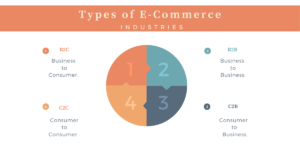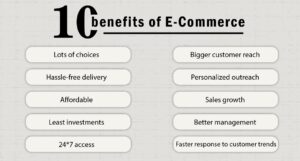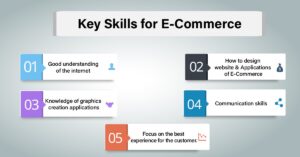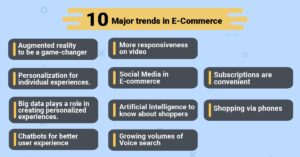
What is E-commerce?
E-Commerce stands for electronic commerce or internet commerce which refers to the buying and selling of and service with the help of the Internet. We all have heard about the amazing E-commerce giants like Amazon, Flipkart, eBay, Walmart, and many more who have evolved in the countries in recent time only with the increase of reach of people to the internet. Anyone sitting in any part of the world can now buy whatever product or service they want at their doorstep just with a click.
Therefore, if you log into any of your E-commerce websites, say Amazon account, and buy a publication or anything, it gives a classic model of an e-commerce transaction. Here you can communicate with the seller providing your product, exchange information, photographs, text, address for shipping, etc., and afterward, you can enter into a transaction.
When the concept of E-commerce was introduced, the first item ordered online on Amazon was a book. Around 25 years later, the e-commerce industry has made over 2 trillion US dollars in sales worldwide, after which there is no setback seen to the sector. As the COVID-19 pandemic is reshaping our world, the time in lockdown has caused an e-commerce boom, with the pandemic accelerating the shift away from physical stores to online stores. With the expansion of the e-commerce sector worldwide, today, a lot of businesses are coming online which is increasing the job opportunities in this field.
Types of E-Commerce industries:
There exist 4 main traditional types of E-commerce models or businesses based on the participants involved in different transactions :

- B2C – Business to consumer. In this approach, businesses target their customers directly and sell their products.
- B2B – Business to business. Here a business links up with another business for mutual benefits. It does not include the final consumer. Hence, it involves manufacturers, wholesalers, and retailers. The most popular examples are Amazon, Flipkart, eBay, etc.
- C2B – Consumer to business. Here a consumer provides its service or product to the business. For Example a freelancer in IT or cinematography etc.
- C2C – Consumer to consumer. In this type, there are no companies involved in the transactions. People interact with each other directly for their mutual exchanges. For example Goods like bikes, cars, furniture, etc. are traded on OLX. People sell and buy their used products online getting into a monetary transaction.
How is E-Commerce benefitting the world?
With everything going online, from shopping to Digital Wallets, the advantages of hassle-free E-Commerce to mankind are endless. The 3 Major Benefits of the E-Commerce industry are:

- Companies can expand their market nowadays by going online in both national and international markets with the least investments.
- E-commerce applications provide users with lots of choices and hassle-free and timely delivery of products sitting at home.
- It provides 24×7 access to markets to the customers.
Not just these, some of the other benefits of e-commerce are:
- Businesses can get customer details and insights via Tracking And Analytics.
- E-commerce gives a faster response to consumer trends by satisfying the market demand.
- Is more affordable
- Bigger customer reach and engagement
- Personalized outreach to individuals through various techniques
- Sales growth with instant rewards. …
- Ability to better manage And “Shelf Space” without any limit.
Scope of E-commerce:
E-Commerce is among the fastest-growing job sectors with increasing opportunities for both businesses and individuals. It is an industry that has not shown any recession till its beginning. In India, metro cities like Delhi, Mumbai, Bangalore, Hyderabad, Kolkata, etc. have a vast scope of e-commerce, being the hub of the IT sector.
The various fields available to search for job opportunities that are flourishing these days in the field of e-commerce are:

- Traveling or ticketing
2. Online Deals
3. Digital downloads of documents and e-tailing
4. Retail and marketplace
5. Education and many other sectors.
After getting any degree or certification in E-Commerce, one can prospect for jobs in E-Commerce Companies like,
- Online Auction Services,
- Software Solution Firms,
- Business Process Outsourcing
- E-Business Solutions Companies, and many others.
A no. of job titles are offered to an E-Commerce specialist, which includes:
- E-Business Consultant
- Supply Chain Manager
- Customer Relation Manager
- Business Analyst
- Project Manager
Database Administrator, and many more.
Some of the top recruiters in the field of E-Commerce are:
 Amazon.
Amazon.
- Flipkart.
- eBay
- Fiverr.
- Upwork.
- Olx.
- Quikr.
Not just jobs, one can also prospect for becoming an entrepreneur and starting up their own business as you have all the required skillsets for the same. E-Commerce startups are less on investments and can grow quickly with the right efforts in the right direction.
E-commerce businesses are incorporating considerable employees for the progress which they’re seeing. 2 of the major retail players have increased the blended workforce from under 10 to 40,000+ personnel, within 6 to 9 yrs of their working 13 worldwide e-commerce players have already entered the Indian market and have additionally expanded their workforce to create by far, the most from the business development. The businesses are predominantly hiring in technical profiles followed by various other crucial profiles like:
- Profit management,
- Pricing,
- Supply chain,
- Product marketing,
- Consumer as well as seller encounter management,
- Merchandising,
- Seller management,
- Content development, and
- Service.
It’s obvious to see that e-commerce businesses have tried and managed to draw the attention of ideal engineering and management brains, and therefore are additionally heading to Silicon Valley in search to employ the best tech talent in the organizations.
With e-commerce businesses coming up with a brand new era of employment opportunities, there continues to be a standard shift of employee expectations. E-commerce businesses offer intense career paths, a large number of possibilities, and skills development, which forces individuals to turn towards a challenging and dynamic work environment.
Best E-Commerce Online Courses in India:
A lot of institutes and colleges provide education in E-commerce seeing the growth prospects in the field offering MBA, BBA, and other diploma courses to their students. The most demanding course in this field is the certification courses provided by many institutes, namely:
- Certification in E-Commerce
- Diploma in E-Commerce
- Advanced Diploma in E-Commerce
- PG Diploma in E-Commerce & Web Technologies
Institutes providing certification courses in the field of E-commerce are:
Data Trained’s 10-month Certificate Program in E-commerce Operations and Marketing comes with a 100% placement guarantee that exposes you to marketing and supply chain, pricing & profit management, customer acquisition, and much more. The program is economical, flexible, coherent, and custom-designed for today’s employment opportunities.
Key offerings of the program:
- More Practical Less Theory
- 10+ Case Studies & Projects
- Learn from Experts with Industry Experience
- Soft Skill Training and CV Building
- 100% Placement Guarantee
- UpTo Date Course Curriculum and Detailed Study Material
- 3 months Internship

Admissions:
Meeting the eligibility criteria is the first task to do. Students applying for undergraduate courses are eligible for doing this course from these institutions after passing their 12th examination. There are two modes by which institutes and colleges take up admission:
- Based on previous grades
- Entrance test
The Key Skills Required are:

- How to design website and applications of E-Commerce
- Good understanding of the internet and world wide web
- Knowledge of graphics creation applications like Dreamweaver, Photoshop, CorelDraw, Fireworks, and many more.
- Communication skills, both verbal and written.
- Focus on the best experience for the customer.
Salary in E-Commerce:
E-commerce is flourishing every day with a rise in the pandemic where people cannot go out for their basic as well as luxury needs. With the growth of the field, demand for individuals with higher experience and better degrees in this field is also increasing.
An individual can expect an average salary in E-commerce starting from Rs 2.5 lacs to Rs 4 lacs per annum. Higher salaries can also be expected with the increase in experience and better skill sets.
Trends in E-Commerce:
There are 10 major trends, evolving the era of E-Commerce which are as follows:
 Personalization for individual experiences.
Personalization for individual experiences.- Augmented reality to be a game-changer
- Social Media in E-commerce
- Artificial Intelligence to know about shoppers
- Big data plays a role in creating personalized experiences.
- Growing volumes of Voice search
- Chatbots for better user experience
- Subscriptions are convenient
- More responsiveness on video
- Shopping via Mobile phones
These are some of the trends which are prevalent however few more trends like:
Growth in B2B ( Business to Business) and is dynamic.
Optimizing digital strategy for conversion.
Sustainability is of more importance.
Allow continued innovation by headless and API-driven e-commerce
which can also be added to this list of trending trends.
Understanding what fashion will be a great match for you’ll usually come right down to understanding your clients, vertical, and competitors forwards and backward. There are several things you can do to assess business fashion and create the proper action for the B2B of yours.
Challenges in E-Commerce:
At the crux of personalization & AI abilities, Chatbots allow outlets to communicate with a massive number of customers while providing them the feeling of personal attention and thoughtful recommendations based on their responses.
Being in the exponential growth numbers, the e-commerce businesses are working with a selection of difficult scenarios as well like:
- Optimization of enterprises and sustainability,
- Regulatory changes,
- Investment pressure,
- Increased competition leading to consolidations and mergers, and
- The tussle with offline companies.
The business might remain in flux and can strengthen in due course to make an expanding yet steady and sustainable model.
However, It’s rapidly changing the landscape of allied industries led by changing customer trends as well as lifestyle changes. Even though the perspective towards E-commerce continues to be good, the businesses, especially in India still have to stand the test of time before it stabilizes, as well as attains far more regulatory maturity as well as monetary sustainability. The e-commerce business isn’t simply hiring, additionally, they upskill individuals through frequent training as well as interventions.
The businesses require competent manpower across the whole spectrum to deliver to the large populations of Indians. What e-commerce can have in terms of producing employment opportunities, is actually among the most fascinating parts of the digital commerce development story.
There is plenty of things that are now taking place in e-commerce. Technology & individuals are constantly evolving, and since e-commerce brings up all the ingredients, businesses are gonna be looking to the future. One factor which is actually for certain is that it is not very late to jump right in, find out something to respond to, and assess whether it is appropriate for your business or not. For today, individuals are in the driver’s seat as well as e-commerce companies are going to be modifying the journey forward for all these people.

















